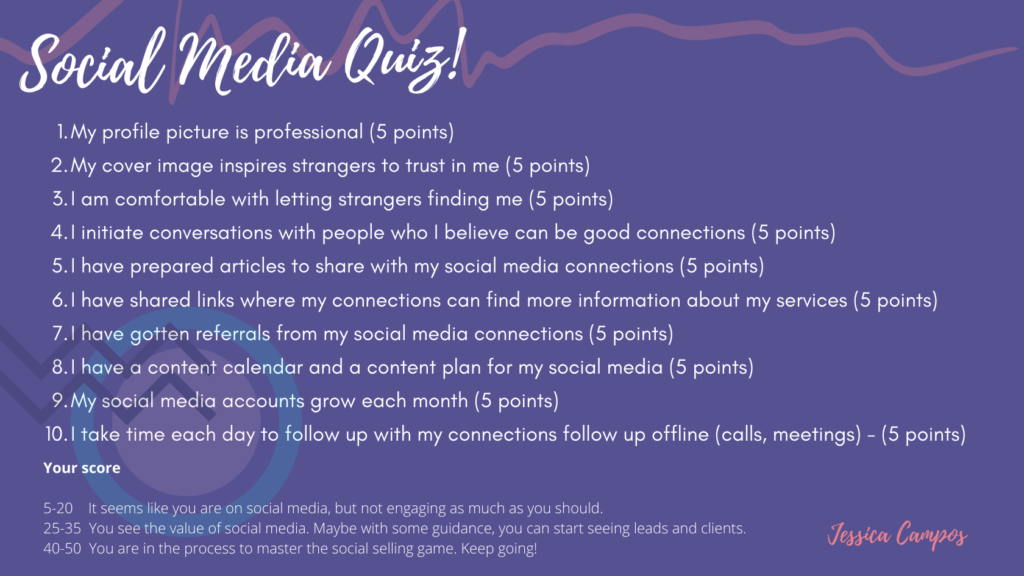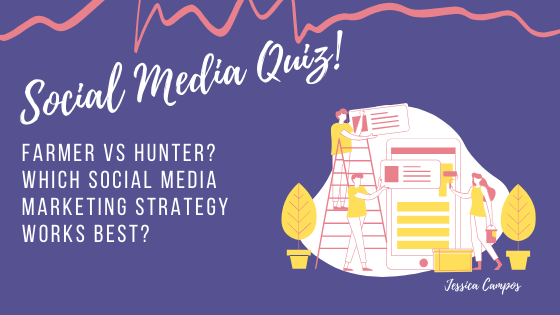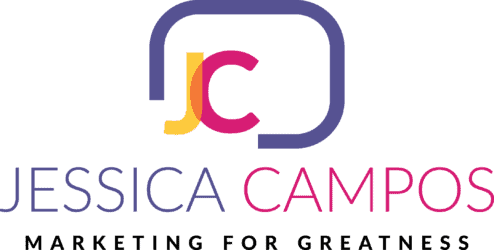Farmer vs Hunter? Which Social Media Marketing Strategy Works Best?
Not sure if your social media marketing strategy follows the “hunters to farmers” sales approach? Want to learn a sophisticated approach to sales using social media?
This article will demystify the hunting and farming approach to social media for you and will give you some tangible steps you can take, starting today, to get the best of your social media channels. Plus, there is a quiz at the end to test your social sales strategy!
Social Marketing vs Advertising On Social Media
If you don’t know the difference between social media marketing and social media advertising, it’s okay to admit it. The distinction can be a bit confusing, especially because there are plenty of voices out there.
Check out two examples of posts:
Post A: Nick Leyden, a fitness coach, is asking a Facebook Group “what is one thing you are doing to stay healthy and active during this time?”
Post B: Capital Factory is sharing an invite to a webinar.
Post A will ignite conversations. Nick doesn’t need to solicit anyone. In fact, he will be able to give some tips and advice, and from there, those users who feel value from him will choose if they want to follow him.
Nick’s post is a brilliant strategy for a Facebook Group where people are open to having a community experience.
Post B is not asking users for any conversation. In fact, it is asking users to stop everything they are doing, read the long-form content, click a link, go to an external page, then read another invite, and fill out a form, and attend a webinar.
Post B is social advertising. Notice that it has the same format that you see on Facebook Ads. While Post B is appropriate for the group, there it won’t have the same engagement as Nick’s post.
If you’re not sure if your content is a social marketing content or social advertising content, here’s a rule:
If it sounds like a radio commercial, you’re advertising.
However, that doesn’t mean that it’s wrong to share content that has a strong call to action. The key is to have a content marketing strategy, so that users welcome your invitation or call to action.
Farmers vs Hunters, In Which Group Are You?
Salesperson reputations stink! In poll after poll, survey respondents typically rank salespeople above only members of Congress on trust, honesty, and competency.
For a long time, in the sales world, people identify themselves as hunters or farmers. What exactly does that mean and in which context?
The Hunters
Hunters are also known as the doers. They get their sales energy through “hunting” new opportunities. Hunters can be described as independent (with a lot of initiative) and solution-driven. They tend to focus on big deals and love going from one to the next as soon as they close their current prospect.
The Farmers
In contrast to the hunters, farmers are more focused on developing long-term relationships. They are the nurturers—building relationships with leads and clients for a lasting impact. They are team players that bring everyone else up and develop strong customer loyalty.
Some entrepreneurs and small business owners have a hard time combining both of the approaches. While it is great to add value and nurture relationships, they still need to close the sale.
How to balance nurturing activities with closing activities? It’s social selling.
The Rise Of Social Selling
Social selling is the art of using social media to find, connect with, understand, and nurture sales prospects. It’s the modern way to develop meaningful relationships with potential customers so you’re the first person or brand a prospect thinks of when they’re ready to buy.
Since social selling has become part of the modern sales processes, both salespeople and entrepreneurs can benefit from the modern social selling method. A big incentive for social selling is that there’s no need for cold calls anymore.
Perhaps equally important to explaining what social selling means is to explain what social selling is not.
It’s certainly not about bombarding strangers with unsolicited posts, tags, and private messages in your social media platforms. There’s a name for that: spam. And you shouldn’t do it.
Social Selling Strategy
If you haven’t implemented a social selling strategy for your social media management, here are some stats that will get you inspired to work on this ASAP!
- 78% of salespeople engaged in social selling are outselling their peers who aren’t. (Forbes)
- 77% of B2B buyers said they do not talk to a salesperson until they’ve performed independent research themselves (Source: CEB)
- 76% of buyers are ready to have a social media conversation with potential providers. (LinkedIn)
- 92% of B2B buyers are willing to engage with a sales professional who is a known industry thought leader.
- 53% of customer loyalty is driven by a salesperson’s ability to deliver unique insight, easily done through social media.
- A full 71% of all sales professionals and 90% of top salespeople are already using social selling tools.
- That percentage gets even higher with the younger generation. 78% of Millennials say they use social selling tools.
- 93% of sales executives have not received any formal training on social selling (source)
Social Selling vs. Social Media Marketing
Is social selling the same thing as social media marketing or advertising?
No. As we explained before, social marketing and social advertising are different things.
Social selling takes the social marketing approach but combines the methodology with ist sales process. They use social media marketing to nurture relationships, turn them into leads and potential sales opportunities.
Social Selling Is All About Value
When interacting with prospects and customers through social networks, it’s important to consider what’s in there for them.
Imagine this scenario: a coworker invited you for a family party. You know a few of other coworkers, but everyone else is a stranger. How do you approach people at the party? Do you stop them, get on their face, and tell them to buy from you? Of course not. You would get to know them first, ask questions, engage in conversations to find things in common.
Adding value is not subject to your opinion. Your users will find value depending on their very own stage. This is what makes marketing a very complex process.
Building A Sales Funnel
During the past few decades, the marketing funnel served as the primary model for how people learn about a product, decide to buy, and (hopefully) become loyal customers, helping spread the word to others.
In today’s age when every product has hoards of competitors, the loyalty loop is a more accurate picture of how the customer reevaluates their decision to buy again and again.
The best way to connect with your audience on Facebook is by mapping their experience, all while considering each stage of their decision-making process. To keep this simple, we’ll narrow the decision-making process into three stages:
- Awareness: People have either become aware of your product or service, or aware that they have a need that must be fulfilled.
- Evaluation: People are aware that your product or service could fulfill their needs, and they’re trying to determine whether you’re the best fit. Users turn into leads.
- Purchase: Leads are ready to make a purchase.
What experience do you want to create for users who are in the awareness stage?
- I want them to feel like they can trust my service or product.
- I want them to identify our unique value proposition quickly.
- I want them to know that they can ask any questions via chat or email.
Strategize Your Social Media Content
Gone are the days when professionals keep their professional and personal accounts separated. People buy you! Entrepreneurs who are able to build a personal brand thrive in social media. Remember, 76% of buyers are ready to have a social media conversation with potential providers.
Your social media channels are the amplifier. But you need a brand and a voice that speaks to your target audience. That’s where your content marketing strategy comes handy.
Social Media Marketing Quiz! See How Ready Are You For Social Selling!

- My profile picture is professional (5 points)
- My cover image inspires strangers to trust in me (5 points)
- I am comfortable with letting strangers finding me (5 points)
- I initiate conversations with people who I believe can be good connections (5 points)
- I have prepared articles to share with my social media connections (5 points)
- I have shared links where my connections can find more information about my services (5 points)
- I have gotten referrals from my social media connections (5 points)
- I have a content calendar and a content plan for my social media (5 points)
- My social media accounts grow each month (5 points)
- I take time each day to follow up with my connections follow up offline (calls, meetings) – (5 points)
Your score
- 5-20 It seems like you are on social media, but not engaging as much as you should.
- 25-35 You see the value of social media. Maybe with some guidance, you can start seeing leads and clients.
- 40-50 You are in the process to master the social selling game. Keep going!
In Closing
If you’re feeling overwhelmed from social media and want to have access to an expert who can remove the guess and make a plan to grow your business, let’s chat!

